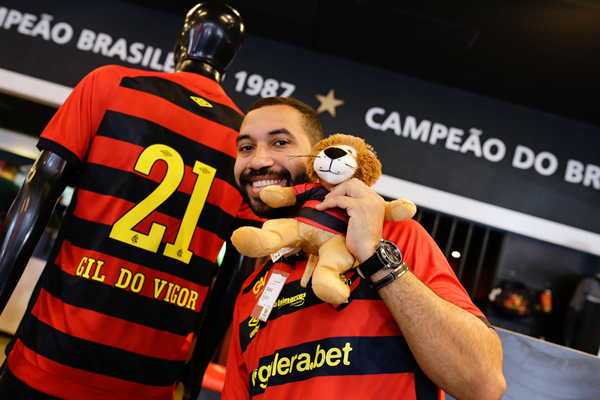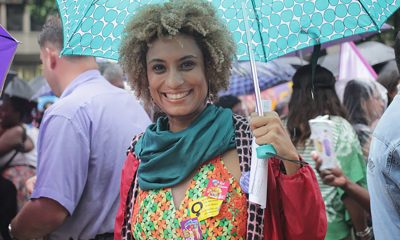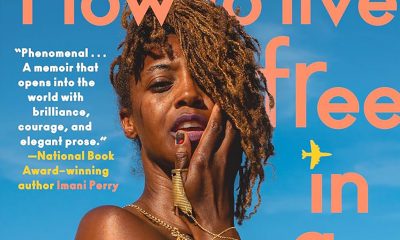World
The gay man who shook Brazilian sports and society
Gilberto Nogueira shares his dream of inclusion

An unexpected trailblazer shook Brazilian society in 2021 and caused significant advancements of LGBTQ rights in historically conservative groups.
Gilberto Nogueira, a reality show superstar, brought to prime-time television what most would think of as contradictions: A sexually liberal person with strong religious convictions; a high-level academic who speaks the language of the people; and, most strikingly, an effeminate and proudly gay man who is also a soccer fan.
Nogueira, or “Gil do Vigor,” which roughly means “Striving Gil” in Portuguese, became a TV phenomenon by almost winning “Big Brother Brazil”, one of the most popular shows in Brazilian television. His unapologetic character struck an enormous fan base that includes some of the most famous Brazilian soccer players and sports journalists. In a matter of weeks, Nogueira managed to build an unexpected alliance of LGBTQ people and sports fans to support him. This would produce lasting change, although it would not come without controversy.
“Dialogue is a great and necessary bridge to long-term changes, which leads us to reflection, reassessment of attitudes, conscious self-assessment, practical actions and much more,” Nogueira told the Washington Blade from California, where he is now pursuing his PhD in economics at the University of California-Davis.
The roots of the fight for diversity in Brazilian soccer can be traced to the 1970s, when a group called “Torcida Coligay” decided to defy homophobes and the then-ruling military dictatorship by bringing together queer fans of the soccer club Grêmio. More recently, tangible outcomes have been achieved.
Since Brazil’s Supreme Court criminalized LGBTQ-phobic violence in 2019, fines and legal sanctions have been applied by sports authorities onto clubs whose supporters chanted homophobic slurs. Drawing from the heritage of Torcida Coligay, the collective “Canarinhos LGBT” has been pressuring restlessly for the enforcement of these measures.
However, as an important part of the Brazilian cultural identity, sports have also entered the cultural war that has dominated Brazil’s public life. Nogueira himself has been in the middle of a battle between two visions of what soccer should be. A fan of the club Sport Recife, Gil was invited by the club for a visit to the team’s stadium. The day after, an audio leak revealed homophobic slurs by one of the club’s advisors, sparking outrage among Nogueira’s supporters and media figures and reaching national headlines. Before the episode, it would be unimaginable to have soccer players showing support for LGBTQ Rights.
Since then, the club’s executive direction, younger and more diverse, and its governing council, older and male-dominated, started a civil war around the expulsion of the advisors. Possibly avoiding further backlash, Nogueira has not been outspoken about this topic in Brazilian media. Asked to comment on this article, he broke his silence.
“Conservatism, patriarchy and homophobia are issues that, in the sports universe, are potentialized because it is an environment where these key themes were rarely brought into the agenda, which is completely inconsistent, as sports are synonymous with inclusion. But the question is: Inclusion for whom?” Nogueira said.
“I see that we are lagging behind and there is little willingness to advance in these debates, and even less will to introduce practices that can foster the debate on gender identities, gender expression, sexual orientation, among others. I also realize that we lack dialogue, and we know that talking about the plurality of life is respecting it, inserting it, sustaining it in such an oppressive environment.” he concluded.
The battle for inclusion in Brazilian sports occurs in the midst of a highly hostile political debate.
About a month ago, Mauricio Souza, a famous volleyball player, was fired from his club after anti-LGBTQ comments on social media. Immediately, he became a symbol of Brazil’s far right, multiplying his followers and gaining support from President Jair Bolsonaro. Souza is now expected to run for the Congress in Bolsonaro’s party.
In this context, Nogueira ‘s contribution for diversity in sports becomes even more remarkable. His persona — evangelical, gay, academic, raised in poverty — defies the typical divide of the deeply polarized Brazilian society. Asked what he would say to other LGBTQ persons living in highly conservative environments such as the church and the soccer stadium, Nogueira states the answer is within.
“There are always answers within ourselves,” he said. “While everyone has the right to speak when, how and if they want to about their orientation or gender identity, genuinely belonging to ourselves is something we will question ourselves throughout our lives”.
Another remarkable characteristic of Nogueira is his firm belief in his dreams. Even having won national recognition, 15 million followers on Instagram and millions of dollars in advertisement, he chose to continue his life-long plan to pursue a PhD at UC Davis. This does not drive him away from his fight for inclusion.
“I intend to conduct relevant research that has a social impact directly related to minorities — in this case, the LGBTQIA+ community and racial issues — so that we can discuss and show that it is important to have diversity in all sectors of the country, and that this will not only bring more equality, but it will also bring development,” he said.
From California, Nogueira has his own segment in a popular TV show, explaining complex economic concepts to common people. This highlights his vision for the future of Brazil.
“I intend to use my theoretical knowledge as an economist … to show that we need to consolidate ourselves as a country that is diverse, respectful, not homophobic, not racist, because otherwise, we pay the price as human beings, but also as a country, as a whole,” he said. Nogueira’s activism and brilliance has shown that Brazilian sports culture is on an inclusive path, but there is still a long way to go. There are very few high-profile athletes who are openly LGBTQ, and in men’s soccer, Brazil’s most popular sport, there are none.
However, Nogueira’s impact, as Michael Sam and Megan Rapinoe in the U.S., is proof that society is changing and this includes formerly homophobic milieus, as the sports arenas.
Egerton Neto is the international coordinator at Aliança Nacional LGBTI+, a Brazilian LGBTQ rights group, and a master candidate at the London School of Economics. Caio Leite is a political scientist.
South America
Argentina government dismisses transgender public sector employees
Country’s Trans Labor Quota Law enacted in 2021

Protests have broken out across Argentina in recent weeks after the dismissal of transgender people from their government jobs.
President Javier Milei’s action is in stark contract with the progress seen in 2023, where the government’s hiring of trans people increased by 900 percent within the framework of the Trans Labor Quota Law that had been in place since 2021.
Among those affected is Sofia Diaz, a “survivor” who shared her testimony with the Washington Blade hours after she traveled from Chaco Province to Buenos Aires to protest her dismissal.
Presentes, an LGBTQ news agency, reported the government dismissed more than 85 trans employees in less than two weeks.
Diaz, 49, holds a degree in combined arts. She joined the National Social Security Administration (ANSES) in 2022 under the Trans Labor Inclusion Law. The layoffs began in January and left many people feeling uncertain and anguished. It was her turn a few days ago.
Diaz in an interview recounted how the situation became progressively more complicated, with difficulties in accessing information about her employment status and the eventual confirmation of dismissals through WhatsApp messages. This government action, according to Diaz, violates the law.
“We were on a Friday, I think on March 24, in the office and we have a WhatsApp group of other colleagues from all over Argentina who entered through the trans labor quota and they tell us if we can get our pay stubs on the intranet,” Diaz recalled. “So, I tried to enter, I could not, I talked to two other colleagues and they told me no, they could not, and so we went to another person. He couldn’t either.”
“Some people told us that it could be a system error. Well, we were never calm, let’s say not how this issue of installing fear and the perversion with which they do it ends,” she added. “This sadism of … inflicting pain and speculating with your misfortune and so on … is something that characterizes Javier Milei’s government.”
Diaz recalled a list of those dismissed from the agency began to circulate from the union in the afternoon. A colleague passed it on to her, “and well, unfortunately I was also on that list.”
“At that moment the whole weekend went by with anguish, crying, and talking with other colleagues from other places, not only trans, but everyone, everyone and everyone,” she said. “On Monday when we went to try to enter, we could not enter with the biometric, which is the thumb we had to use every morning to enter.”
Despite the difficult moment through which she is going, the trans activist stressed to the Blade that she will continue protesting and will even sue the government because her dismissal is illegal and “violates the constitution itself.”
The LGBTQ community and its allies have mobilized and organized demonstrations, highlighting the importance of defending the rights won and fighting against discrimination and exclusion. Diaz emphasized the fight is not only for the people affected today, but also for future generations, saying the historical memory of the struggles for inclusion and social justice must be kept alive.
“The Argentine government thus faces a key challenge in human and labor rights, where public pressure and social mobilization can play a determining role in protecting the rights of LGBTQ+ people,” Diaz said.
Africa
For queer Nigerians, being on gay dating apps is still a risk
Homophobes target users for violence

Gay hookup apps like Grindr, and dating apps like Tinder and Bumble have managed to proliferate queer communities in countries like Nigeria.
Those who seek one night stands find what they want while those looking for love equally find what they seek. These platforms have managed to position themselves as safe spaces for queer people in anti-gay Nigeria. In recent times, however, it is proving to be unsafe, as homophobic people are quickly learning about the apps, and opening accounts that either seek to outrightly threaten queer people, or pretend to be queer, have long chats with gay people, invite them over, and inflict violence on them.
Take the case of Biodun, a queer Nigerian man who joined Grindr to meet up with guys like him.
After Biodun had built a connection and agreed to meet with someone whose display name was “Mamba,” they decided to meet up only for him to be met with violence. Apparently, Mamba ran a catfish account.
“I’ll never forget that day,” Biodun, who asked the Washington Blade not to use his last name because of safety concerns, said. “I still think about it, and sometimes blame myself for being very careless, even though Grindr was supposed to be our safe space.”
Biodun’s experience isn’t peculiar to him.
In Nigeria, draconian laws that criminalize same-sex relationships exist, making queer people turn to the digital realm to explore their identities and seek connections beyond the confines of societal oppression that comes with the physical environment. Gay dating apps such as Grindr, therefore, have emerged as virtual sanctuaries, offering spaces for queer Nigerians to forge friendships, find solidarity, and pursue romantic or sexual relationships. Spaces like this, however, have morphed into a landscape fraught with danger, as homophobic people have weaponized these platforms to perpetuate hate and violence.
“Sometimes, I often wonder how they learned about these platforms,” Daniel, which is not his real name, told the Blade. “You would think that it is just us in the platforms, until you find out that the accounts are rooted in homophobia.”
One time, someone’s bio read, “I’m only here to deal with the gay people. I know all of you, and I will find and kill you. We no want una for here (translates to we do not want you here, in English.)” It was a stark reminder that these spaces are no longer LGBTQ-friendly for Nigerians. In 2014, there was the passage of the Same-Sex Marriage Prohibition Act by former President Goodluck Jonathan, which not only criminalized same-sex unions, but also imposed severe penalties on anyone involved in LGBTQ advocacy or support.
This law catalyzed a surge in discrimination and violence against queer Nigerians; emboldening regular civilians, religious extremists, and even law enforcement agencies to target individuals perceived as deviating from traditional gender and sexual norms. Again, amid this hostile environment, gay dating apps emerged as lifelines for many queer Nigerians, offering avenues for discreet communication, community building, and the pursuit of intimate relationships.
The very anonymity and freedom these apps provided, however, became double-edged swords.
The advent of screenshot and screen-recording capabilities on these apps, for example, reduced the risks of exposure, strengthening the safety and privacy of users. However, this also comes with its own lapses, as queer people using Grindr have often relied on screenshots and screen recordings to confirm the identities of potentials with their friends, before accepting to meet.
“Before the removal of the screenshot option, I usually shared photos of others with my trusted friends,” Biodun shared. “But since that was taken off, there was no way for me to do that.”
Although, according to Grindr’s terms and conditions, the removal came with privacy concerns, as it was to facilitate a safe dating experience.
This erosion of digital safe spaces is depriving queer Nigerians of vital avenues for self-expression and affirmation,and is exacerbating the psychological toll of living in a society that continues to systematically demonize their identities. Moreover, the normalization of homophobic rhetoric and violence in both physical and digital realms has perpetuated a cycle of fear and oppression, and is reinforcing this notion that LGBTQ individuals are inherently unworthy of dignity and respect. Despite these challenges, though, the resilience of queer Nigerians continue to persist, as they defy societal norms and assert their right to love and be loved.

Dominica’s High Court of Justice on Monday struck down provisions of a law that criminalized consensual same-sex sexual relations.
A gay man who remains anonymous in 2019 challenged sections of the country’s Sexual Offenses Act that criminalized anal sex and “gross indecency” with up to 10 years and 12 years in prison respectively. The plaintiff argued the provisions violated his constitutional rights.
The Dominica Equality and Sexual Expression Association and the Eastern Caribbean Alliance for Diversity and Equality, a group that advocates for LGBTQ and intersex rights in the region, in a press release noted the court in its ruling affirmed “the criminalization of consensual same-sex activity between adults is unconstitutional.” The groups added Justice Kimberly Cenac-Phulgence “declared that the laws commonly known as buggery and gross indecency laws, contravenes the constitution of the Commonwealth of Dominica, namely the right to liberty, freedom of expression, and protection of personal privacy.”
“It is long past time that the dignity and dreams of all Dominicans were recognized,” said DESEA Executive Director Sylvester Jno Baptiste in the press release. “We are all God’s children, and he loves us all equally. Laws that treat some Dominicans as less than others, have no place in a just society.”
Dominica is a former British colony that is located between Guadeloupe and Martinique in the Lesser Antilles.
Antigua and Barbuda, St. Kitts and Nevis, Barbados, and Trinidad and Tobago in recent years have decriminalized consensual same-sex sexual relations.
The Inter-American Commission on Human Rights in 2021 issued a decision that said Jamaica must repeal its colonial-era sodomy law. The country’s Supreme Court last year ruled against a gay man who challenged it.
A judge on St. Vincent and the Grenadines’s top court in February dismissed two cases that challenged the country’s sodomy laws.
“Decriminalization helps create an environment where LGBTQ individuals can live openly without fear of persecution, enabling them to access health care, education, and employment without facing discrimination,” said Outright Executive Director Maria Sjödin on Monday in response to the Dominica ruling. “The repeal of these discriminatory laws is a testament to the tireless efforts of activists, advocates, and allies who have long fought for justice and equality. It is a victory for human rights and a significant milestone in the ongoing struggle for LGBTQ rights in the Caribbean.”
-

 State Department2 days ago
State Department2 days agoState Department releases annual human rights report
-

 Maryland4 days ago
Maryland4 days agoJoe Vogel campaign holds ‘Big Gay Canvass Kickoff’
-

 Politics3 days ago
Politics3 days agoSmithsonian staff concerned about future of LGBTQ programming amid GOP scrutiny
-

 The White House1 day ago
The White House1 day agoWhite House debuts action plan targeting pollutants in drinking water












